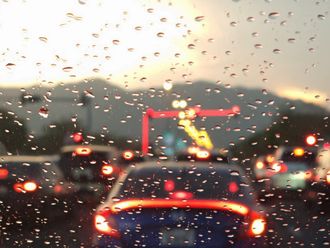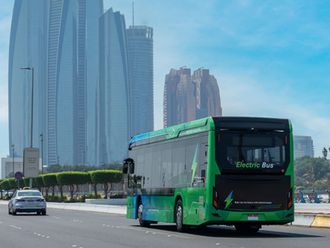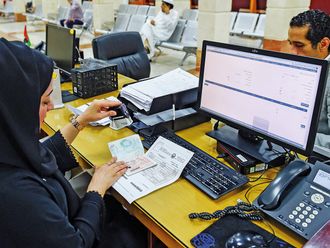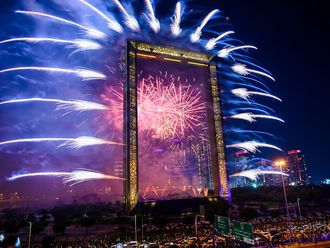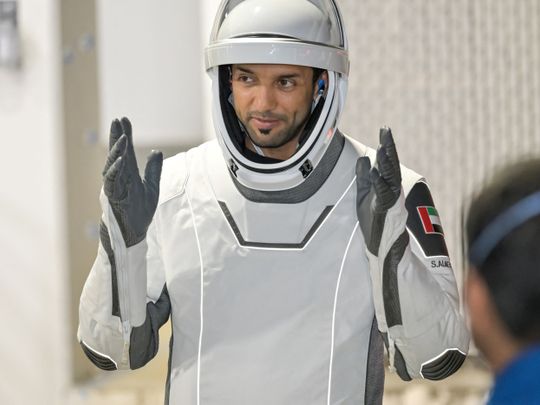
Dubai: An out-of-this-world welcome awaits UAE astronaut Sultan Al Neyadi in his homeland as he lands in Abu Dhabi on Monday, September 18, after his triumphant journey from space to Earth.
The nation is set to honour the ‘Sultan of Space’ after he completed the longest Arab space mission onboard the International Space Station (ISS) - lasting six months - and the first spacewalk by an Arab.
Al Neyadi, along with three other NASA SpaceX Crew-6 crewmates, splashed down from the ISS in the SpaceX Dragon spacecraft Endeavour off the coast of Jacksonville, Florida in the US at 8.17am UAE time on September 4.
They then flew to NASA’s Johnson Space Centre in Houston, US, for a two-week rehabilitation programme to readjust to gravity and life on Earth.
A hero’s welcome has been arranged for the 42-year-old Emirati astronaut from Al Ain who is returning home after more than a year, including the six months he spent aboard the ISS and the training period away from the UAE.
Message of gratitude
Ahead of his grand homecoming, Al Neyadi sent a message of thanks and gratitude to all those who supported him, from the wise leadership to his family and friends and those who worked for his mission’s success.
He expressed his profound sense of unity and achievement in a video shared by the Mohammed Bin Rashid Space Centre (MBRSC) in Dubai, the agency behind the UAE Astronaut Programme, on its account on microblogging platform X (formerly Twitter).
Al Neyadi said: “Hello, this time I greet you from Earth after we returned safely from space. It has been an incredible journey, going to space and spending six months on board the ISS, and I am overwhelmed with joy upon our return to Earth, coupled with the incredible reception and engagement from people near and far.”
He added: “Our mission has been accomplished, yet this marks the beginning of a series of contributions we aspire to make in this field. We always emphasise that our mission is but a fragment of a larger, dynamic system. While we were in the vanguard, it was the relentless efforts and dedication of numerous individuals working behind the scenes for countless months that propelled this mission to success.”
He further said: “I find myself at a loss for words to truly express my deep gratitude to everyone who played a role in the success of this mission — from our wise leadership in the UAE to my supportive family and friends, and the committed team at the Mohammed Bin Rashid Space Centre.”
Al Neyadi also took the opportunity to thank NASA and other international partners who made his mission possible.
The former network engineer with the UAE Armed Forces is expected to be accompanied by top officials of the MBRSC as he flies into Abu Dhabi from Houston.
Fully prepared to fly home
Salem Humaid Al Marri, director-general of MBSC, stated on X that Al Neyadi is “fully prepared to return home”.
Al Marri shared a photo of him with MBRSC team members who are stationed in Houston. “We are present with the administrative, medical and technical teams in Houston with Sultan and he is fully prepared to return home, God willing, on Monday,” he stated.
Al Marri said the scientific programme and the work schedule that Al Neyadi had started after returning from the ISS had been continuing and things were “fine”.
“Every time we talk, he tells us about his enthusiasm and longing for his homeland after an absence of more than a year spent between training and the mission in space,” Al Marri added.
The father-of-six was received by his family members including his father, wife and brother at Houston after his historic return to Earth. However, Al Neyadi is yet to meet his children, including one born during his space mission, and other family members.
'Good news'
Earlier, on Saturday, Dr Hanan Al Suwaidi, Flight Surgeon, MBRSC, presented an update on the rehabilitation phase that the ‘Sultan of Space’ is undergoing.
In a video message on MBRSC’s account on X, Dr Hanan said: “I have some good news to share with you. A few days have passed since Sultan and his crewmates returned to Earth. Today, they are undergoing a rehabilitation programme, and medical tests and continuing the research assigned to them. Sultan’s health is improving not only daily, but also hour by hour.”
March 3: Al Neyadi and Crew-6 colleagues float into the International Space Station
April 28: Al Neyadi performs the first-ever spacewalk by an Arab
September 3: SpaceX Dragon Endeavour undocks from the ISS with Crew-6
September 4: Endeavour splashes down off the coast of Jacksonville, Florida, US
September 12: Al Neyadi and 2 crewmates make their first public appearance after return to Earth on NASA TV
September 18: Sultan of Space to return to the homeland, the UAE
‘Everything felt heavy’
Speaking about his mission for the first time following their return to Earth, Al Neyadi on September 12 had revealed the challenges he faced following his re-entry into our planet’s atmosphere. “Well, it felt really, really heavy,” he said.
Having spent 186 days in microgravity, Al Neyadi admitted that the weighty sensation even prompted him to forego drinking water as he felt the water bottle was “heavy like a tonne”.
However, he was amazed at how rapidly the human body can adapt to the sudden shift from microgravity to Earth’s gravitational pull.
“It’s amazing how quickly you can get better,” he remarked, revealing that the process of recovery unfolds by the hour.
Despite all the challenges, he said he wished to go to space again and given a chance, travel with the same crewmates.
What’s next?
Once he is in the UAE, Al Neyadi is expected to share his experiences with the people of the country, especially students.
In another video shared by MBRSC on Sunday, Hazzaa Al Mansoori - the UAE’s first astronaut to go to space in 2019 and Al Neyadi’s reserve astronaut for the UAE Mission 2 - spoke about Al Neyadi’s immediate task after returning to the UAE.
“Following the success of the UAE Mission 2, the next phase will focus on returning to the UAE, and sharing this unique experience with different entities such as schools, universities, and the people by my colleague Sultan Al Neyadi,” Al Mansoori said.
Al Mansoori, who now holds the profile of Astronauts Office Manager at MBRSC as per his title seen in the video, said one of the objectives of the UAE Astronaut Programme is to promote science, share knowledge, and inspire future generations.
Future missions
“In addition, my colleagues Nora Al Matrooshi and Mohammad Al Mulla are currently in Houston as part of NASA’s Astronaut Candidate Class,” he said, referring to the second batch of Emirati astronauts.
“They are training on the different modules and systems of the International Space Station, preparing for spacewalks and learning to operate robotic arms. The main goal of this is to prepare Emirati astronauts for future missions,” added Al Mansoori, who was also the first Arab Increment for the Expedition 69 involving Crew-6 onboard the ISS.
Historic feat
Al Neyadi blasted off to space with Crew-6 on March 3 and spent 186 days in space to complete the first long-duration human space flight mission to be undertaken by an Arab aboard the ISS. He scripted history for the second time when he became the first Arab to conduct a spacewalk, an Extravehicular Activity (EVA), in the vacuum of outer space outside the ISS on April 28.
Benefits for humankind
Al Neyadi’s mission included over 200 scientific experiments and technology demonstrations, the results of which are expected to benefit humankind back on Earth and future human spaceflight missions.
Additionally, his outreach initiatives and consistent communication about his activities in space kept not just the UAE, but the entire region engaged and informed about space topics.
After spending a week or so in the UAE, he is expected to fly back to Houston to complete the research work.
Al Neyadi’s historic mission was named Zayed Ambition 2 as it was the second edition of the UAE Astronaut Programme which aimed to fulfil the ambition of the UAE’s Founding Father, the late Sheikh Zayed bin Sultan Al Nahyan.
The UAE Astronaut Programme is funded by the ICT Fund of the Telecommunications and Digital Government Regulatory Authority (TDRA).
Mission highlights in numbers
• Duration of longest Arab space mission: 6 months
• No of days in space: 186
• No of days onboard ISS:184
• Time spent in outer space for spacewalk: 7:01 hours
• Distance logged aboard ISS: 79 million miles
• No of orbits around Earth completed: 2,976
• No of experiments conducted: Over 200




